No disrespect meant to Abner Doubleday or Alexander Cartwright or anybody else who might claim responsibility for the game we call baseball, but Thutmose III had them beat by three millennia or so. Thutmose ruled Egypt during the 15th century BC, and is the first known pharaoh to have depicted himself in a ritual known as "seker-hemat," which Peter Piccione has loosely translated as "batting the ball."
"The word they use is `sequer,' which literally means `to strike' or `to hit,"' said Piccione, 51, an Egyptologist and professor of comparative ancient history at the College of Charleston in South Carolina, "but in the context, he's there with the bat. I translated it as `batting the ball."'
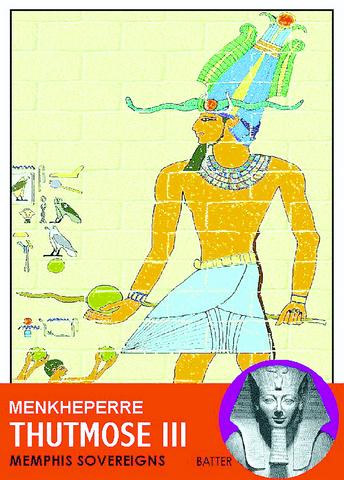
PHOTO: NYT
The context he's referring to is a wall relief at the shrine of Hathor, the goddess of love and joy, in Hatshepsut's temple at Deir-el-Bahari, where Thutmose is seen holding a softball-size ball in one hand and a long stick, wavy at the end, in the other. The hieroglyphic over the scene reads: "Batting the ball for Hathor, who is foremost in Thebes." The date is 1475 BC.
Piccione makes a specialty of Egyptian religion.
He's particularly interested in the sports and games that the ancient Egyptians included in festivals honoring certain deities, a pursuit that led him to muse on the relationship between ancient Egyptian "baseball" and American baseball.
His findings are included in a popular lecture -- called "Pharaoh at the Bat" -- that he recently delivered in Charleston and has been honing since delivering a paper on the subject at the National Baseball Hall of Fame in 1995. In it, he describes a relationship similar to the one between, say, pterodactyls and cardinals, orioles or blue jays.
"There's no direct connection, and Egyptians don't play anything like this at all today," Piccione said. "But the Egyptian game did function as a precursor. There are only a few bat and ball games that have ever been around."
Actually, Piccione said, Egyptians probably batted the ball around, even if it was just for infield practice or a game of pepper, for nearly 1,000 years before Thutmose III. There are references to the activity in inscriptions inside the pyramids dating to 2400 BC.
Evidently the Egyptians weren't merely sluggers. They had a healthy respect as well for defense; the picture of Thutmose also shows two priests, small figures, in the act of catching a ball.
"They have their arms raised up and balls in their hands like you would catch a softball," Piccione said. "The inscription says, `Catching it for him by the servants of the gods."'
It isn't known precisely how the game was played, or if the umpires wore chest protectors. "To be honest, we don't know if they did any running," Piccione said, "but I suspect they did, because kings did a lot of running rituals."
Actually, the connections Piccione's lecture makes between then and there and here and now are more broadly cultural in nature.
"It started in Egypt as purely a boys' game," said Piccione. "And it was probably played in a festival, so the actual ball-playing took on some kind of religious meaning because it was played in a religious context."
When the king came out and played, therefore, the excitement and fun of the game and its religious meaning were consolidated, he said.
"Baseball functions the same way," he said. "Over time it has accumulated meaning. It's an interesting parallel development."
He cites the idea that every spring baseball starts up again, and as such it has become a ritual of the season. He cites the mythology that grows up around the players and lasts for generations, the near godliness of figures like Babe Ruth, the identification of the game with our country.
Happily, both in his lecture and in the interview, Piccione stopped before his musings got too ponderous. He finished both with a reading from his own version of Ernest Lawrence Thayer's Casey at the Bat, which ends, alas, just as badly for the home team: "O' somewhere in the Aten's circuit, the sun is shining bright, Nubian drums play somewhere and Hittite hearts are light/In Babylon men are laughing, in Nineveh children shout, But there is no joy in Mud-brickville, Great Pharaoh has struck out."
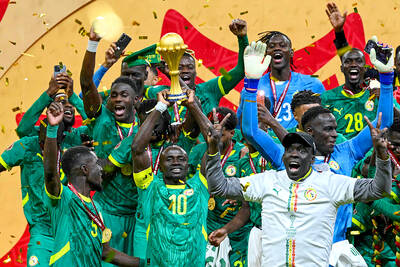
MARRED FINAL: As most of Senegalese players walked off the pitch after a controversial decision, some supporters threw objects and attempted to get onto the pitch Senegal on Sunday won the Africa Cup of Nations (AFCON) as Pape Gueye’s extra-time winner sunk hosts Morocco 1-0 after a chaotic final that saw the eventual champions storm off the pitch late in the game. Brahim Diaz could have won the trophy for Morocco with a controversial spot-kick in the 24th minute of added time at the end of normal time as ugly scenes broke out in the stands. However, Senegal goalkeeper Edouard Mendy easily saved the weak attempted “Panenka” chip by the Real Madrid winger, who was clearly distracted by the long delay that followed the penalty award.
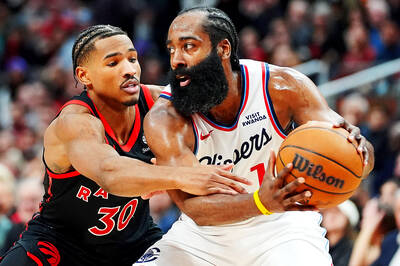
James Harden on Friday scored 31 points and came up big in overtime to help the Los Angeles Clippers erase a double-digit deficit on the way to a 121-117 NBA victory over the Toronto Raptors. Harden scored 16 points in the fourth quarter and overtime as the Clippers pushed their wining steak to five games despite the absence of star Kawhi Leonard with a sprained right ankle. The Clippers trailed by 11 entering the fourth quarter, but Harden drilled a pair of free-throws with 1:24 left in regulation to tie it and after misses from both teams, they went to
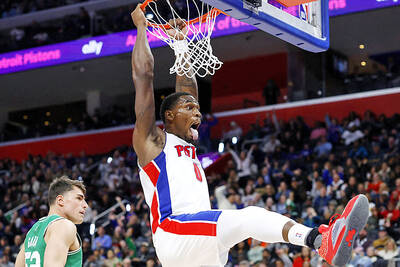
Tobias Harris on Monday scored 25 points as the Detroit Pistons held off the Boston Celtics to score a 104-103 victory in their top-of-the-table Eastern Conference showdown. Harris was one of four Detroit players to finish in double figures, with Jalen Duren adding 18 points and point guard Cade Cunningham scoring 16 points with 14 assists. The win sees Detroit extend their lead at the top of the Eastern Conference to 31-10, 5.5 games ahead of second-placed Boston, who fell to 26-16 with the defeat. Jaylen Brown led the Celtics scoring with 32 points and almost snatched victory in the
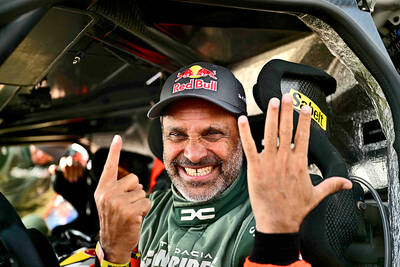
Qatar’s Nasser al-Attiyah on Saturday secured his sixth Dakar Rally car title in Saudi Arabia with Luciano Benavides scraping home by two seconds to claim the motorbike title. “We’ve worked very hard since last year. I might not be showing much emotion yet, but it’s there, deep down. We are so happy to win,” al-Attiyah said at the finish. Al-Attiyah, at the wheel of a Dacia, only had to avoid a final day slip-up to top the podium after bringing his career tally of stage wins to 50 on Friday. The 55-year-old, who took clay pigeon shooting bronze at the